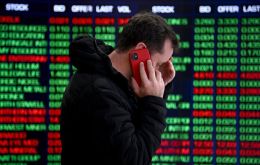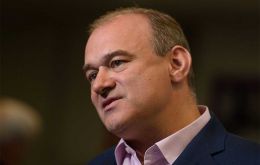MercoPress. South Atlantic News Agency
United States
-
Monday, April 14th 2025 - 18:56 UTC
Bukele becomes first LatAm leader Trump welcomes at White House

Presidents Donald Trump of the United States and Nayib Bukele of El Salvador got together Monday morning at the White House, marking the Central American visitor the first Latin American leader to he hosted by the Republican head of State since his return to office. It was also the first visit by a Salvadoran president since 2014, when Barack Obama welcomed Salvador Sánchez Cerén.
-
Saturday, April 12th 2025 - 10:49 UTC
Lula enacts Reciprocity Law in reaction to Trump's tariffs

Brazilian President Luiz Inácio Lula da Silva enacted the so-called Reciprocity Law on Friday, whereby the federal government can react whenever countries or economic blocs create measures restricting Brazilian exports, be it in the form of surcharges or objections to the origin of the product. The measure is to be published in Monday's issue of the Diário Oficial da União (Federal Official Gazette).
-
Saturday, April 12th 2025 - 10:44 UTC
WB and IDB pledge further funding for Milei's Argentina

The World Bank (WB) announced Friday a US$ 12 billion financing package for Argentina over three years to support economic stabilization and reforms. Pending board approval, the initiative consists of several contributions as follows:
-
Friday, April 11th 2025 - 08:42 UTC
US official admits no more meat to be bought from Argentina

US Secretary of Agriculture Brooke Rollins confirmed that her country would not be purchasing any more meat from Argentina in a protectionist move to preserve local production. “No more meat from Argentina,” she said during a Fox News interview.
-
Thursday, April 10th 2025 - 19:29 UTC
US Secretary of the Treasury due in Buenos Aires next week

US Secretary of the Treasury Scott K.H. Bessent will arrive in Buenos Aires next Monday to bolster support for Argentine President Javier Milei’s economic reforms, it was announced Thursday.
-
Thursday, April 10th 2025 - 10:40 UTC
Trump lowers huge tariffs for everybody but ups those for China

US President Donald Trump Wednesday announced a 90-day freeze on reciprocal tariffs for most countries, reducing them to a 10% baseline, while raising tariffs on Chinese goods to 125%, effective immediately. The decision followed negotiations with over 75 nations interested in new trade terms, spurred by Trump’s initial tariff announcements last week.
-
Wednesday, April 9th 2025 - 10:57 UTC
Trump ups tariffs on Chinese products to 104%

US President Donald Trump has escalated the trade war with China by imposing a 104% tariff on all imports from that country, effective immediately, the White House announced Tuesday. This follows China’s retaliatory 34% tariff on US goods to take effect on Thursday.
-
Tuesday, April 8th 2025 - 09:40 UTC
Israel to suppress all tariffs on US goods, Netanyahu tells Trump

Israeli Prime Minister Benjamin Netanyahu Monday said at the White House that his Government would eliminate tariffs and trade barriers on US imports to address the trade deficit with Washington. He made those remarks amid global market declines of over 7%, triggered by tariffs imposed by President Donald Trump, which amount to 17% in the case of Israel.
-
Monday, April 7th 2025 - 23:14 UTC
Markets slump worldwide amid Trump’s tariff war and recession fears

US stocks experienced significant volatility Monday amid a global trade war sparked by President Donald Trump’s tariffs. In addition, Washington threatened China to impose an additional 50% surcharge if Beijing does not retract its own 34% increase by Tuesday.
-
Monday, April 7th 2025 - 10:57 UTC
Trump’s 41% tariff on Falklands, “biggest threat since Argentine invasion”, Liberal Democrat leader

The leader of UK’s Liberal Democrats, Ed Davey has called on the Prime Minister to meet with the Falklands Governor, after President Trump announced tariffs of 41% on exports from the Falkland Islands to the United States.
